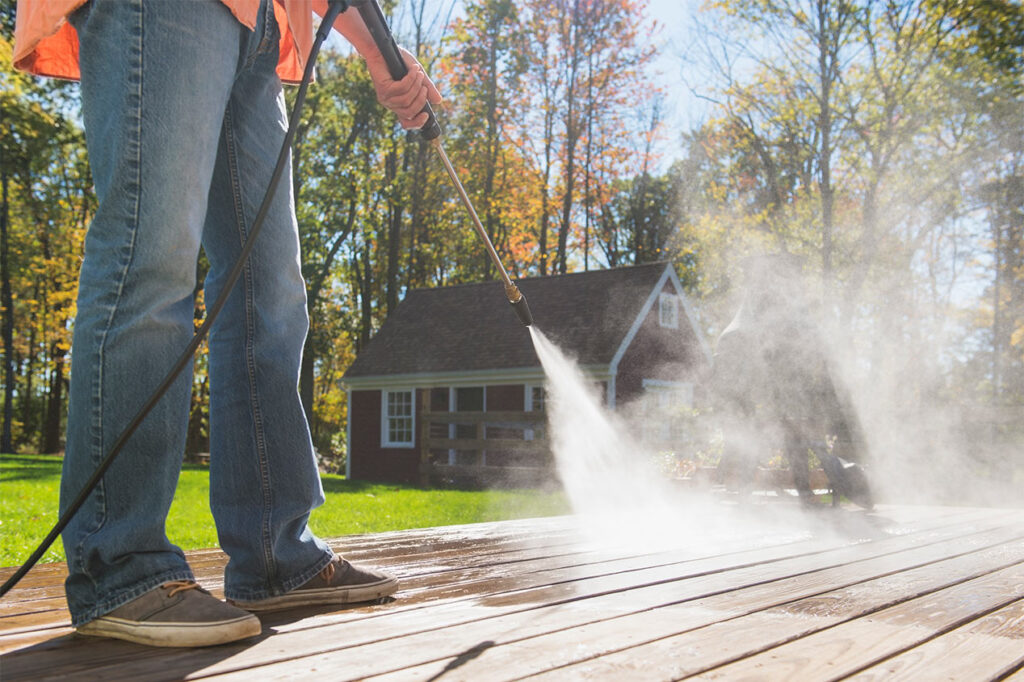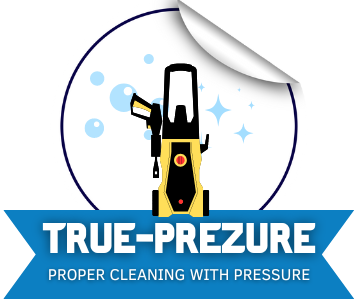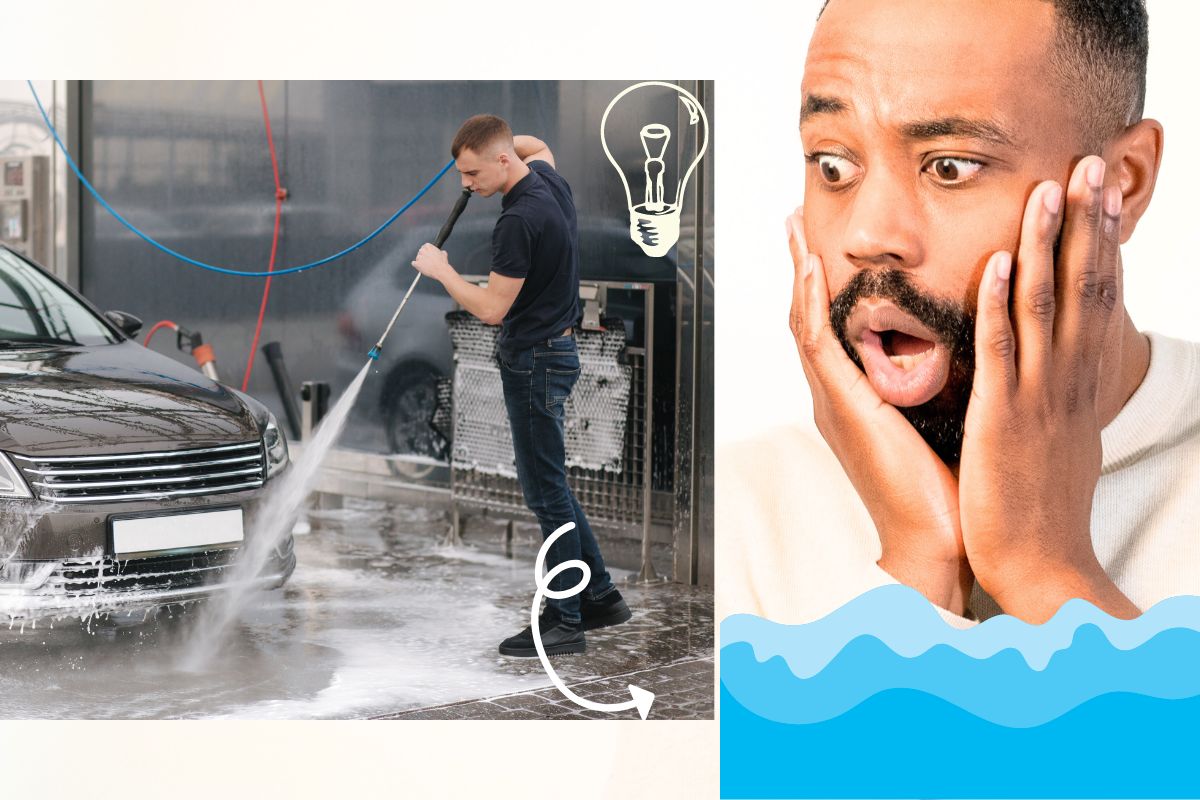Are you tired of scrubbing away at tough stains and grime on your outdoor surfaces? Look no further than a pressure washer! This handy tool uses the power of water to blast away dirt, leaving your driveway, patio or deck looking like new.
But have you ever wondered how much water it takes to operate a pressure washer effectively?
In this article, we’ll dive into the details and give you everything you need to know about how much water a pressure washer uses. Get ready to say goodbye to stubborn stains and hello to sparkling clean surfaces in no time!
What is a pressure washer?
A pressure washer is a powerful cleaning tool that uses high-pressure water to remove stubborn dirt and grime from outdoor surfaces. It typically consists of a motorized pump that pressurizes water, which then flows through a hose and nozzle to create an intense jet of water.
How to Adjust Pressure on a Pressure Washer?

The force of the pressure washer’s stream can vary depending on the model, but it’s typically strong enough to blast away even the most stubborn stains. Some pressure washers also come with adjustable nozzles that allow you to switch between different spray patterns for more precise cleaning.
Pressure washers are commonly used for cleaning concrete driveways, sidewalks, decks, patios, siding, and other outdoor surfaces. They can also be used for tasks like washing cars or boats. Essentially, any surface that needs deep cleaning can benefit from the use of a pressure washer.
However, it’s important to note that not all surfaces are suitable for pressure washing – delicate materials like wood or glass could be damaged by too much force. As always, make sure to follow manufacturer instructions carefully when using your machine!
How much water does a pressure washer use?
The amount of water a pressure washer uses is a crucial factor to consider when determining its efficiency and impact on your water bill. Several key factors influence the water consumption of a pressure washer, including the type of machine, its size, and the specific cleaning task at hand. Here’s a detailed breakdown:

Type of Pressure Washer:
- Residential-Grade Pressure Washers: These are typically smaller and less powerful units designed for household use. They usually consume between 1.5 to 2 gallons of water per minute (GPM). This lower water consumption makes them suitable for tasks like cleaning cars, decks, sidewalks, and smaller surface areas.
- Commercial-Grade Pressure Washers: Commercial-grade or industrial pressure washers are larger, more powerful, and designed for heavy-duty cleaning tasks. They can consume significantly more water, ranging from 3 GPM to 10 GPM or even more. These machines are commonly used for cleaning large industrial equipment, buildings, and expansive surface areas.
Pressure Washer Nozzle Tips:
- The choice of nozzle tip can also affect water consumption. Pressure washers come with a range of nozzle tips, each with a different spray pattern and flow rate. Using a nozzle with a narrower spray pattern (higher pressure) will generally use less water compared to a wider spray pattern (lower pressure).Can you use 2000 PSI Pressure Washer on Car?
Cleaning Task:
- The specific cleaning task will heavily influence the amount of water you use. For instance, removing heavy grime and dirt from a surface may require more water to achieve effective cleaning, while lighter cleaning tasks may use less.
Water Source:
- The water supply to your pressure washer matters as well. If you’re using a pressure washer with a lower GPM rating but have a limited water supply, it may take longer to complete a task as you’ll need to factor in the time it takes to refill the water tank or reservoir.
Conservation Practices:
- Regardless of the pressure washer type and GPM rating, you can minimize water usage by employing efficient cleaning techniques. For example, pre-soaking surfaces, using environmentally-friendly detergents to aid in cleaning, and employing the appropriate pressure level can reduce water waste.
Regulations and Local Restrictions:
- It’s important to be aware of any local water regulations or restrictions that may apply to pressure washer use. Some areas may have rules in place to limit water consumption during certain times or for specific purposes.
It’s worth noting that higher GPM doesn’t always equate to better cleaning performance. In fact, if you’re not careful, high-pressure washers with excessive flow rates can cause damage to surfaces like wood and concrete.
Another factor that affects water usage is nozzle selection – different nozzles will affect the amount of water flowing through your machine. For example, a narrow spray pattern will use less water than a wide fan spray pattern.
Pressure Washer Soap Injector Not Working? Expert Guide!
It’s essential to find the right balance between effective cleaning power and efficient use of resources when choosing a pressure washer for any job you undertake.
The benefits of using a pressure washer
Using a pressure washer indeed offers numerous benefits, making it a valuable tool for various cleaning tasks. Here’s a detailed exploration of the advantages of using a pressure washer:
Time and Effort Savings:
- Pressure washers are incredibly efficient at removing dirt, grime, and stains from surfaces. Their powerful jets of water can dislodge and wash away stubborn contaminants with minimal physical effort. This means you can accomplish cleaning tasks much faster than if you were to scrub manually.
Property Value Preservation:
- Regularly cleaning your property’s exterior with a pressure washer can significantly contribute to maintaining its visual appeal and overall condition. This is especially important if you intend to sell your property in the future, as a well-maintained appearance can enhance curb appeal and property value.
Health and Safety Benefits:
- Pressure washing helps eliminate harmful contaminants such as mold, bacteria, algae, and mildew from outdoor surfaces. These contaminants can not only mar the appearance of your property but also have adverse health effects, including respiratory issues. Pressure washing can improve air quality and create a healthier living environment.
Water Efficiency:
- Despite their powerful cleaning capabilities, pressure washers are designed to be water-efficient. The high-pressure equipment effectively uses less water than traditional methods like hosing down an area repeatedly. This not only conserves a precious resource but also saves you money on your water bill.
Versatility:
- Pressure washers come with various nozzle attachments that allow you to adjust the water pressure and spray pattern to suit different cleaning tasks. Whether you’re cleaning delicate surfaces like windows, or tackling tough, built-up grime on driveways or decks, pressure washers offer versatility and adaptability.
Safety Improvements:
- Cleaning outdoor surfaces with a pressure washer can significantly reduce the risk of accidents caused by slips and falls. This is particularly important in areas prone to mold or algae growth, which can make surfaces dangerously slippery.
Eco-Friendly Cleaning:
- Pressure washing is an eco-friendly cleaning method because it typically requires fewer chemicals than manual scrubbing. The high-pressure water alone can often remove dirt and stains effectively, reducing the need for harsh cleaning agents that can harm the environment.
Long-Term Cost Savings:
- While the initial investment in a pressure washer may seem significant, the long-term cost savings from reduced water usage, lower cleaning chemical expenses, and extended property maintenance can make it a financially wise choice.
For more information on pressure washing techniques and equipment, you can visit PressureWashr. They provide in-depth guides and reviews to help you make informed decisions about pressure washer selection and usage.
In addition, if you’re interested in learning about eco-friendly cleaning practices and their environmental benefits, you can explore EPA’s Green Cleaning Guide. This resource offers insights into sustainable cleaning solutions that align with environmentally responsible practices.
How to use a pressure washer
Using a pressure washer may seem intimidating, but it’s actually quite simple. First, connect your water source to the pressure washer and turn on the water supply. Next, plug in your pressure washer and turn it on. Make sure you’re using the appropriate nozzle for the task at hand – a narrow nozzle for tougher dirt and grime or a wider one for more general cleaning.
When starting out, hold the wand about two feet away from the surface you’re cleaning and move closer gradually if needed. Keep in mind that too much pressure can damage some surfaces like wood or paint, so test an inconspicuous area first.
Move side-to-side while keeping a steady distance from whatever you’re washing to ensure even coverage. For vertical surfaces such as walls or fences, start at the bottom and work your way up to avoid streaking.Ryobi Vs Greenworks Pressure Washer winner in 2023
When finished with your task always follow proper safety measures by turning off both the machine and water supply before disconnecting any hoses or nozzles.
Pressure washer tips and tricks
Pressure washing can be a daunting task, especially if you’re new to it. But with these essential tips and tricks, you’ll master the art of pressure washing in no time.
Firstly, always wear protective gear such as goggles and gloves when using your pressure washer. This will prevent any injuries from flying debris or chemical splashes.
Secondly, start with the lowest pressure setting on the machine and gradually increase it if needed. This will prevent damage to delicate surfaces like wood or soft plastics.
Thirdly, use detergents specifically designed for pressure washers to get the best results. These detergents are formulated to work at high pressures and temperatures.
Fourthly, always keep a steady distance between your nozzle and the surface being cleaned. Too much distance can reduce effectiveness while too little can cause damage.
Fifthly, avoid using your pressure washer on electrical components or outlets as water may enter them, causing shorts or electrocution hazards.
Lastly but not least important, is never point your nozzle directly at people or animals as this could cause severe harm. Follow these vital tips and tricks for successful cleaning every time!
Conclusion
After reviewing all the information provided in this article, it’s evident that pressure washers are indeed a potent tool for cleaning a wide range of surfaces. Their ability to effortlessly remove dirt, grime, and stubborn stains is undeniable.
A frequently asked question regarding pressure washers pertains to their water usage. The response to this inquiry hinges on several key factors, including the type of pressure washer in use, its PSI (pounds per square inch) rating, and GPM (gallons per minute) rate. These variables collectively determine the efficiency and water consumption of the pressure washer during various cleaning tasks.
FAQ
How many gallons does it take to pressure wash a driveway?
Pressure washing a driveway’s water requirement varies depending on factors like driveway size and dirt level. On average, a standard-sized driveway needs about 50-100 gallons of water. Larger or dirtier driveways may require more. It’s vital to avoid excessive water usage for efficiency and environmental reasons. Using a high-pressure setting can help achieve effective cleaning with less water.
For more details on water-efficient pressure washing practices, visit EPA’s WaterSense Program. They offer insights into water-saving techniques during various household activities, including outdoor cleaning.
How many gallons of water do you need with the pressure washer?
The water requirement for pressure washers varies based on their type, PSI rating, GPM flow rate, and the task at hand. For light-duty tasks like car washing, 1.5-2 GPM is sufficient. Medium-duty tasks like deck cleaning need 2-3 GPM, while heavy-duty jobs like paint stripping require 4 GPM or more. Using the right amount of water is crucial to avoid surface damage and conserve resources.
To learn more about water-efficient pressure washing practices and conservation tips, you can visit EPA’s WaterSense Program. They provide valuable insights into water-saving techniques during various household activities, including outdoor cleaning.
.
How many GPM does a pressure washer need?
When choosing a pressure washer, the GPM (gallons per minute) rating is crucial. It indicates the water flow rate and impacts cleaning power and efficiency. Higher GPM offers more cleaning power but uses more water, potentially leading to wastage. The ideal GPM depends on the task.
For light-duty tasks like car washing, 1-2 GPM may suffice. Tougher jobs, like stain removal on concrete, may need 3-4 GPM. Consider your needs carefully before selecting a pressure washer based solely on its maximum flow rate.
For further guidance on choosing the right pressure washer, you can visit Consumer Reports. They provide comprehensive information on pressure washer selection, usage, and maintenance to make informed decisions.
Is 2.5 gallons per minute good for a pressure washer?
Whether 2.5 gallons per minute (GPM) is good for a pressure washer depends on your specific requirements. For light-duty tasks like car or outdoor furniture washing, 2.5 GPM suffices. However, tougher jobs, such as cleaning concrete driveways or large decks with heavy grime, may necessitate a higher GPM for efficiency.
While high-GPM pressure washers clean faster, they consume more water, raising environmental concerns if not used judiciously. Choosing a pressure washer that suits your needs while considering environmental impact is crucial.
For more information on eco-friendly pressure washing practices, you can visit the Environmental Protection Agency (EPA). They offer insights into water conservation and responsible outdoor cleaning.

